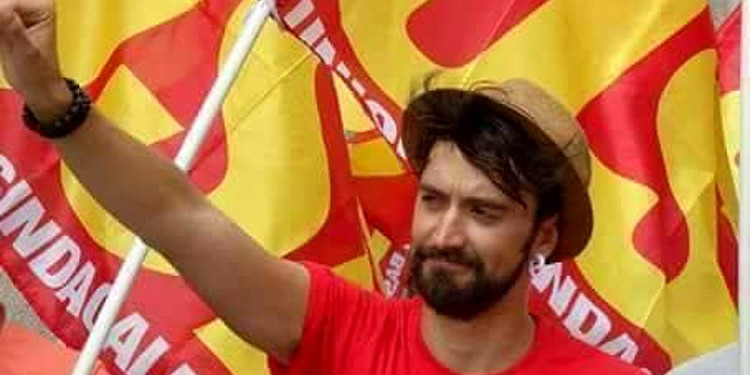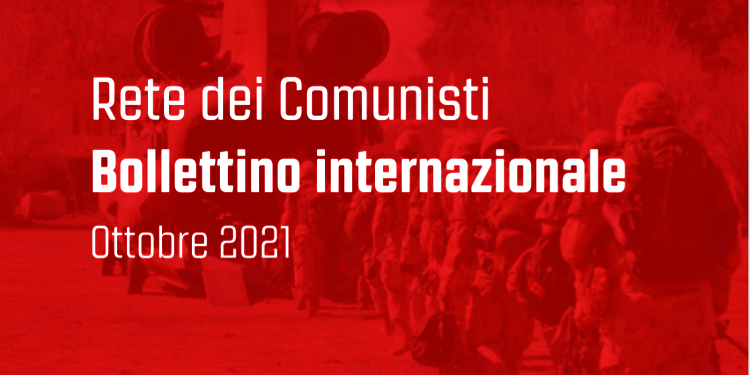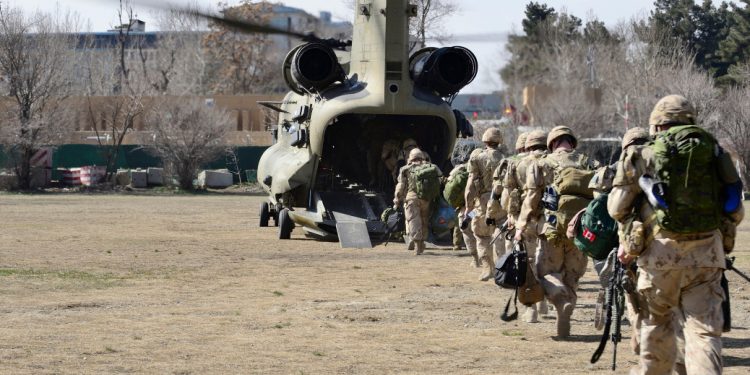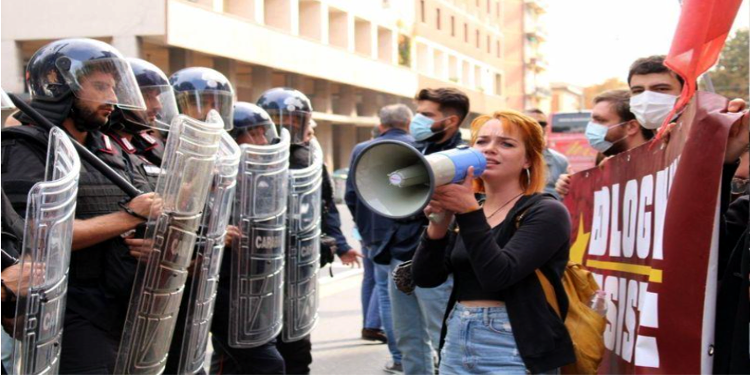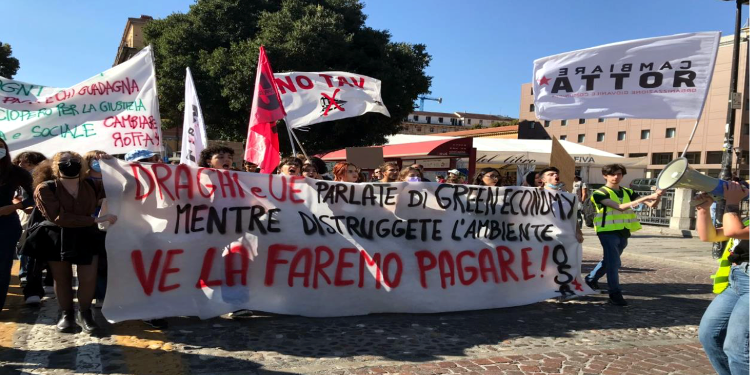english | español | français | italiano |
Interview with Sasha Colautti, USB Private Sector
As Rete dei Comunisti, we interviewed Sasha Colautti of the Unione Sindacale di Base – Private Sector in view of the general strike on 11 October to take stock of the various steps the union has taken in recent months.
Question – On Saturday 8 May in Genoa, the USB set up the Maritime-Port Workers’ Coordination, an important step that sees the union now present in all segments of the logistics chain, becoming a pole of attraction for more and more combative workers in the sector. The newly-formed Coordination was immediately successful in tackling two issues in particular, which it was able to tackle head-on by promoting strikes and initiatives. It promoted a 24-hour strike on safety – on 14 June – after the umpteenth death of a port worker (in this case in Salerno), and called for a boycott of the transport of weapons of war in ports during the Zionist offensive on Gaza.
In your speech in Genoa on 8 May, you strongly emphasised the need to break the monopoly of representation of the CGIL. CISL and UIL, which, together with ‘corporate fascism’, acts as a combination to annihilate the more generous thrusts of workers who demand wages, rights and guarantees, and puts a straitjacket on the development of confrontational unionism.
What steps forward do you think have been taken in recent months on this issue at the trade union level?
Sasha Colautti – USB continues its strong numerical growth in the private sector, numbers that are in contrast to the decline in those of CGIL, CISL and UIL, organisations that appear to be increasingly in difficulty in terms of representing workers in the flesh.
CGIL, CISL and UIL have chosen a model of representation that is completely self-referential, not based on workers’ consent, but hinged on the employers’ recognition that is bestowed from time to time after the signing of a union agreement: ‘You only represent if you sign (bad) agreements’
This model, as we have all seen – starting with the further de-structuring of the contractual model in 2009 and then with the subsequent ‘Marchionne agreement’ on the Fiat CCSL – has led to a systematic emptying out of national bargaining due to the fact that today national bargaining is mortally embraced with the recognition given by the counterparty through representation understood as ‘presence at the tables’ and the recognition of the opportunities (hence trade union permits) due to the signatories of these contracts. A model which, among other things, makes these organisations survive economically: the national contracts are now linked in a double way in the management of welfare, pension funds and obviously the ‘contractual quotas’. So the organisations that sign national contracts know that this signature is also linked to very important – and for them necessary – economic revenues.
USB has chosen to counterbalance the framework I have outlined above with a model of representation that starts with the workers, which aims to have an impact through conflict and the creation of real power relations. A model far removed from self-referentiality and from being called to the tables ‘just because you are a signatory to a contract’.
We are living in a phase in which our choices on the strategic plan are allowing us to be present in the companies and sit on the most important negotiating tables only thanks to our real representation, the weight of the members and the struggles that we are able to put in place.
The entry of USB in the ports of Genoa, Livorno and Trieste is an important factor because it is not an element of extemporaneousness, but is part of a precise choice that USB has made at the level of general conflict and initiative confederal and private. A choice then sealed by the assembly of 19 June in Bologna
Question – In fact, on 19 June an important and well attended assembly of workers and delegates of the Unione Sindacale di Base was held in Bologna: “From the assembly line to the value chain” which strongly reaffirmed the centrality of the class question, the need for conflict within a union hypothesis organised at the confederal level, and the fact that within the organised labour movement “the game of democracy in this country is played” as Guido Lutrario, of the Federation of Social Work and exponent of the National Executive, said.
It must be remembered that it was an assembly held the day after the strike called by all the grassroots unions in logistics and which saw a Si.Cobas militant – Adil Belakhdim – killed during a picket in front of the Lidl logistics centre in Biandrate.
You opened the initiative, rightly defining it as having a ‘congressional flavour’. What were the issues that emerged at that meeting which, in your opinion, came to the fore in the months that followed and what impact did they have on the debate within the union?
Sasha Colautti – Yes, it’s true, I defined that appointment as having a ‘congressional flavour’ and it’s true precisely because of what I was saying in response to the previous question: because of the pandemic we were forced to postpone the congress. However, our growth in numbers, both in terms of members and new delegates, led to an internal debate which, during the pandemic, resulted in many moments of public debate through initiatives, including online initiatives, which were very well attended. In those months it became clearer that the analysis of the importance of the so-called ‘value chain’ as a strategic objective of our struggle was finally matured in practice. A weak point to be hit in the framework of the current capital restructuring process.
The pandemic has made the ‘production-transport-distribution’ value chain even more fragmented, and production cycles now become the object of further attacks, including relocations. However, there is also a process of ‘regionalisation’ of the supply-chain, which can become a sensitive target of trade union struggles in factories, logistics and even in the retail sector.
Recognising this element as a key factor for our trade union-political choices from my point of view also opens up a discussion on the trade union model that we have in mind, which is why I believe that the ‘workers’ assembly in Bologna outlined a congressional line.
Today the term ‘confederal union’ has taken on a negative connotation because we come from twenty years in which the so-called ‘confederal’ unions have distorted its true meaning. CGIL, CISL and UIL are completely disengaged from the very idea of confederality, because they have become the primary proponents of a clear division between categories, workplaces and workers.
Question: This summer, an agreement was reached between the ‘social partners’ (government, Confindustria and CGIL, CISL and UIL) that unblocked the possibility of dismissal from 1 July, not prolonging one of the measures that had allowed the pandemic crisis not to immediately become a social catastrophe for a large number of employees. The agreement, from which only a few sectors were excluded (textiles, footwear, fashion), did not in fact bind companies in any way, ‘recommending’ (this is the term used) to the bosses to make them do 13 weeks of redundancy fund, paid by the state – that is, the community – before firing them.
From that day on, a real social butchery began. Can you give us a brief outline of the phase that began after one of the worst trade union agreements of all time?
Sasha Colautti – It really is the worst trade union agreement of all time. The reality is that it is not even an agreement, but a resounding “supination”, not at all unexpected to tell the truth, in the face of the demands of Bonomi’s Confindustria and the government.
It is an agreement that does not place any constraints or limits, nor does it contain any obligations for companies. In fact, the text contains an ‘invitation, a recommendation’ to use 13 weeks of redundancy pay before dismissing. Such a thing has never been seen or heard of before, and the great thing is that Landini and co. They sold it as a great result, the fruit of an incredible effort.
A surreal thing, made even more surreal by the immediate opening of heavy company restructuring, with the announcement of hundreds of redundancies in many important industrial realities, one above all GKN, but we can also talk about Giannetti wheels, Timken, ABB, Fedex. These immediate situations were immediately followed by Stellantis, which announced that it had 12,000 too many workers, and finally Alitalia, whose serious crisis situation we all know about today.
Among these, the GKN dispute was the one that succeeded most in drawing attention to the choices made by these multinationals, which, without looking anyone in the face and after taking millions of euros in state subsidies, lay off hundreds of workers, bringing the economy of an entire territory to its knees.
Some have been quick to criticise ‘the method used’ (the case of dismissal by email is now famous), but the point is not the method, but the fact itself.
Let’s start by saying that releasing redundancies in the midst of a still open pandemic emergency was not a brilliant move. And this, as far as industry is concerned, is compounded by the fact that most sectors (Automotive and Steel) are undergoing major transformations due to ecological reconversion.
In such a phase it was quite obvious that companies would immediately seize the opportunity to open a phase of heavy and uncontrolled restructuring. The absence of the state on the strategic industrial choices is evident and where they have been almost and exclusively in support of the company’s choices.
Question: On 11 October there will be a general strike called by all the grassroots unions. One of the initiatives that the USB is proposing to the workers of companies fighting against restructuring, factory closures and redundancies is a demonstration in front of the Ministry of Economic Development – MISE – in Rome, where more than a hundred ‘crisis tables’ are open and seem to have no solution. Can you describe how it is taking shape and how it relates to the question of requisitioning and nationalisation strongly posed by USB as a hypothesis of employment defence, within important disputes such as those of Alitalia or ILVA workers?
Sasha Colautti – The crisis tables at the Ministry of Economic Development, if we also include the verification tables and sectoral crises, today concern almost one hundred thousand workers. The decision to launch an appeal for a demonstration under the MISE of the companies in crisis responds precisely to the need to put work back at the centre, unifying the struggles.
The greatest fault of the confederal trade union and the CGIL in particular is that of managing these disputes as individual entities, as if they were not part of the same logic.
I mention GKN again because it seems to me the most emblematic case of this pattern:
A dispute that even in the media took on such an important characterisation, was managed without ever wanting to determine a framework of broader strategic initiative. This happened despite the fact that the ‘GKN Factory Collective’, hegemonised by the FIOM, had asked its union organisation and promoted the need for a general strike on several occasions. This signal was never taken, not even by the CGIL blue suits.
Is it possible to kiss Draghi’s feet, unblock the redundancies… and at the same time ‘rise up’ with the GKN workers?
The answer is clearly no.
These are the ambiguities that in our opinion must disappear from all struggles, ambiguities that concern the strategic function of the union, which must express itself clearly in opposition to the policies of this government.
Yesterday I read that the GKN Collective has joined the general strike called by USB together with other grassroots organisations, which obviously makes us happy. The invitation to be present under the Ministry is clearly addressed to them as well.
The demonstration in front of the ministry is intended to emphasise the need for the state to return to being “director” of its own industrial choices. Personally, I am not in love with formulas, but I base myself on the experience of the tables on which we are sitting, where the so-called “state intervention” is limited to guaranteeing the entry of capital into companies that are essentially nationalised only on paper, an excellent example of this is the former Ilva, now Acciaierie D’Italia: the state is the majority shareholder, but who determines industrial policies is Arcelor Mittal.
The role we are thinking of is that of guiding ecological industrial reconversion, determining a model of economic development that responds to citizens and workers, committed to guaranteeing employment levels and income. A model that also addresses the issue of reducing working hours for the same wage, precisely in order to guarantee employment.
The state must be the one to make and guide investment choices in strategically important sectors. Companies that must be defended first and foremost against hostile takeovers of public interests.
On the 11th we will be at the MISE to reconfirm these claims, which we, as USB, have been bringing to the tables with the government for months.
Question: The Recovery Fund approved by the Draghi government on the strict instructions of the European Union seems to involve a gigantic restructuring of the manufacturing sector using ecological transition and digitalisation as vectors. What employment consequences are likely to result from such choices, considering that there has been no adaptation of social cushioning instruments?
Sasha Colautti – In connection with the previous question, in which I basically said what we think, this allows me to say what the Draghi government is doing.
The disbursement of PNRR funds is subordinated to compliance with a multitude of constraints. Constraints that are in fact a political manifesto aimed at devastating the welfare state and guaranteeing a model that determines economic policies “outside the choices of the state”.
Every penny of the NRP is aimed at guaranteeing an economic model centred on privatisation, cutting social spending and, of course, determining industrial policies to ensure greater flexibility, exploitation and lower labour costs.
Think of the multi-party attack on the welfare state, against citizenship income and the guaranteed minimum wage (also opposed by CGIL, CISL and UIL), right up to the proposed reform of social security, with differentiated universalism, as envisaged by the government.
Alitalia, on the other hand, represents the face of the unscrupulous attack on labour, in which it is the government that is the “master”, cutting thousands of jobs and de-facto applying the “Marchionne model” to the newborn ITA company, which will only hire part of the workers under dramatically worse conditions.
The applause reserved for Draghi, the standing ovation at the Confindustria assembly, is not by chance. Through the Alitalia dispute, this government is dictating the political line to the employers in this country. We will therefore be in all the Italian squares on the 11th, in Rome under the ministries, to say enough to the government of the bosses and its accomplices.
(Published in Italian on October 8, 2021)

